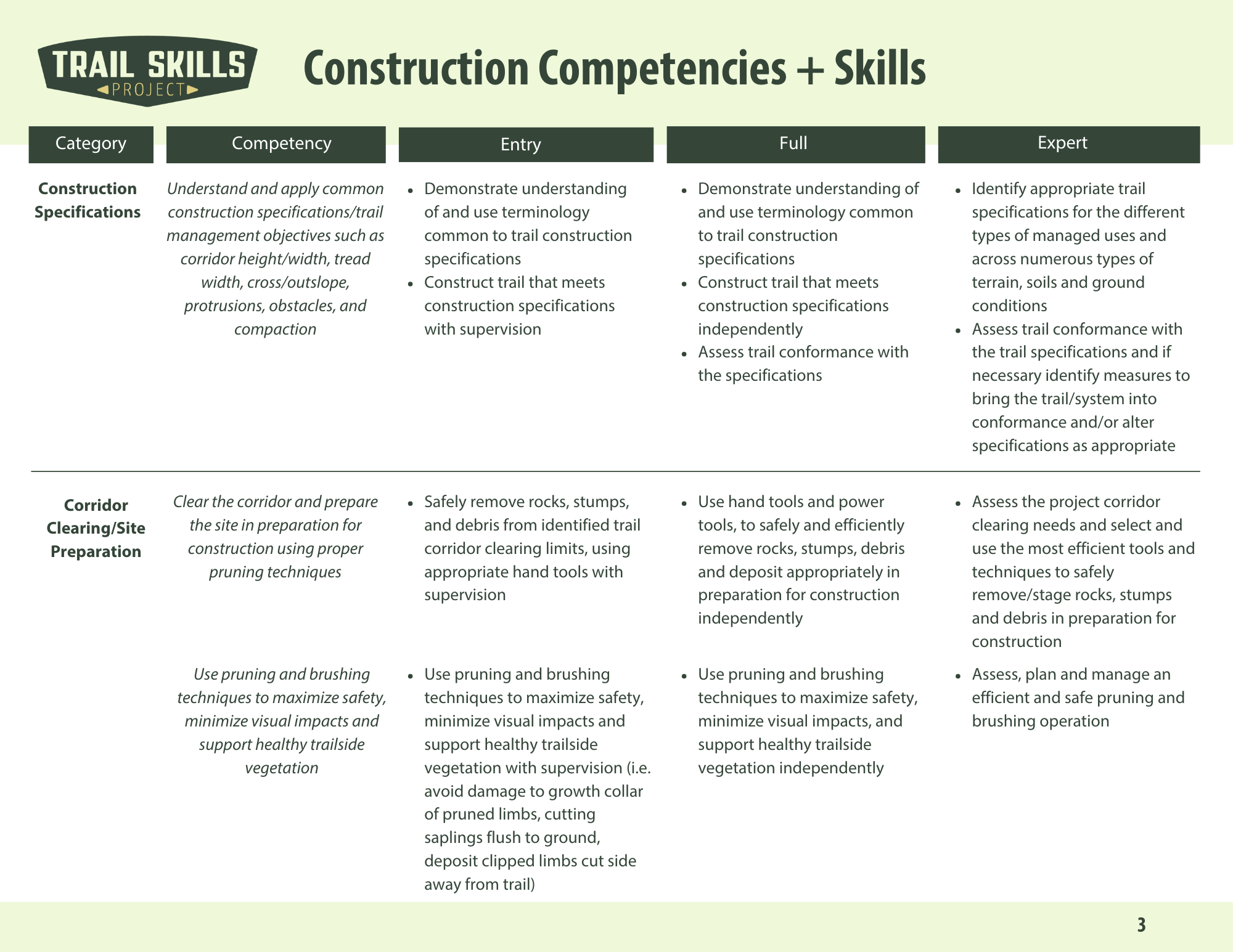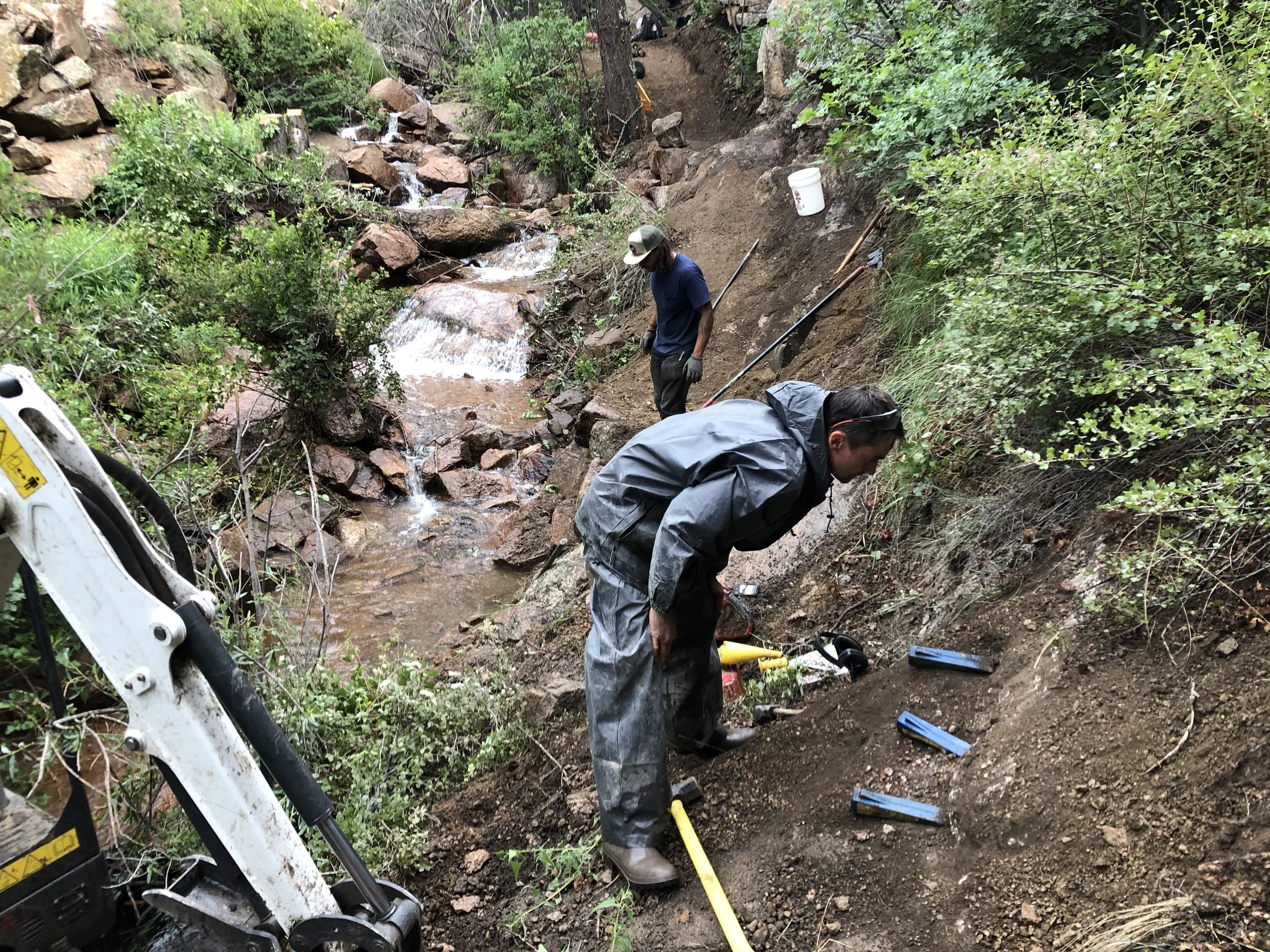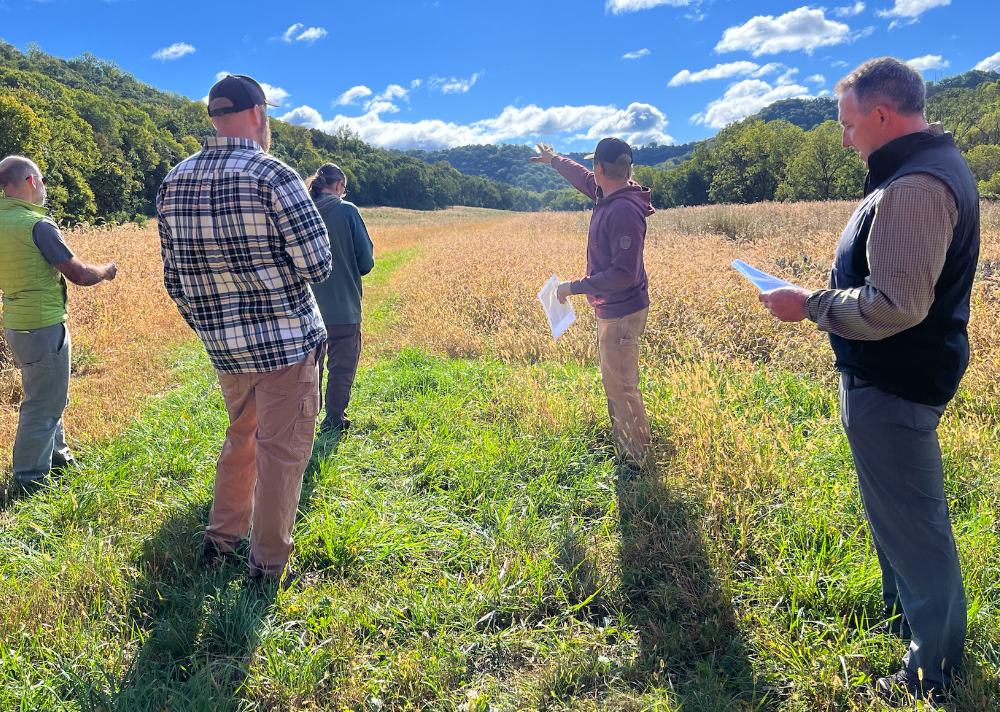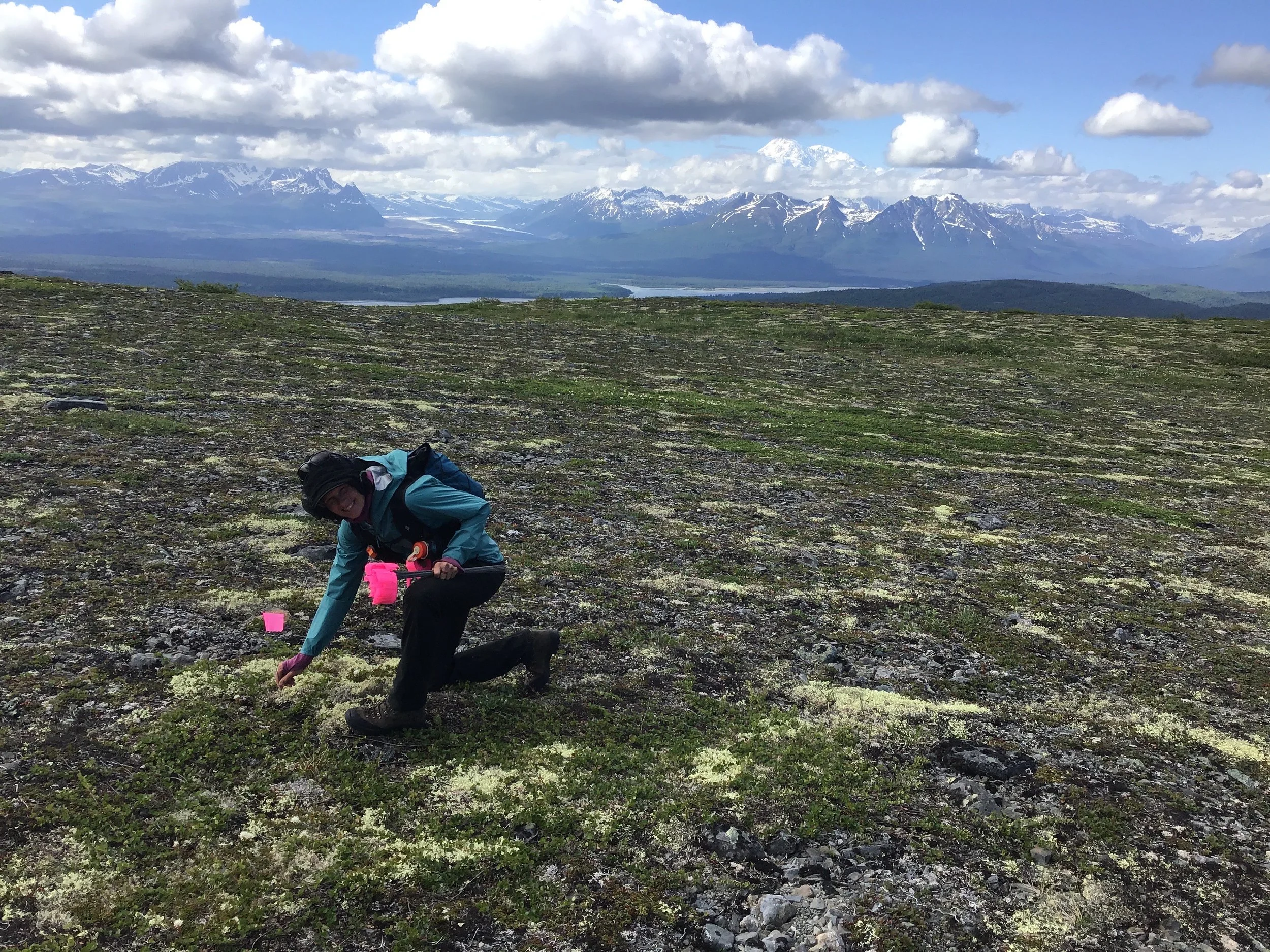
Going Pro:
A Career in Trails
Photo: Flowride Concepts
Discover a Career in the Trail Industry
PTBA is the trade association for the trail industry and represents private sector companies who plan, design, and build all types of trails around the globe.
This resource is especially focused on the technical expertise of people who work on trails full-time utilizing diverse and specialty skill sets including:
Trail Construction (hand and mechanized)
Trail Design
Field Layout + Flagging
Trail Master Planning
Bridges and Boardwalks
Stonework + Rigging
Technical Training + Education
Trail Restoration + Reclamation
Bike parks and pump tracks
In addition to working in the private sector, there are many jobs within the trails world - here are a few examples:
Managing a trail system for a public agency like a state park or the Forest Service
Leading and training volunteers for a nonprofit that stewards a long-distance trail
Maintaining local trails for a friends group
Managing a grant program that funds trail projects
Management, fundraising, and/or communications for a trail-based non-profit organization
Day on the Job: Erin Amadon, Town 4 Trail Services
Thanks to Maine Outdoor Brands for telling the story of Maine’s outdoor industry - including PTBA board member Erin Amadon.

“This isn’t just a summer job, it is a REAL and rewarding career path.”
“I wish someone had told me this industry existed when I was a high school and college student.”
Photo: Ptarmigan Trails
Why PTBA members pursued a career in trails
Passion for the outdoors, trails, and nature – A deep love for natural spaces and a desire to work within them.
Creating a legacy and positive impact – Building trails that last and benefit people and the environment.
Blending personal skills and passions – Merging education, experience, and personal interests into a fulfilling career.
Building sustainable, well-designed trails – Commitment to quality, sustainability, and user experience.
Opportunity for outdoor, hands-on work – Enjoying physical challenges, problem-solving, and being active.
Desire for independence and creativity – Working outside of corporate settings, using craftsmanship and artistry.
Encouraging outdoor recreation – Promoting active lifestyles, community health, and access to nature.
Fun, excitement, and personal fulfillment – Trail work is mentally and physically rewarding, and just plain fun.
Volunteering turned into a career – Many started as volunteers and turned passion projects into livelihoods.
Supporting conservation and stewardship – Protecting natural resources and creating sustainable access for future generations.
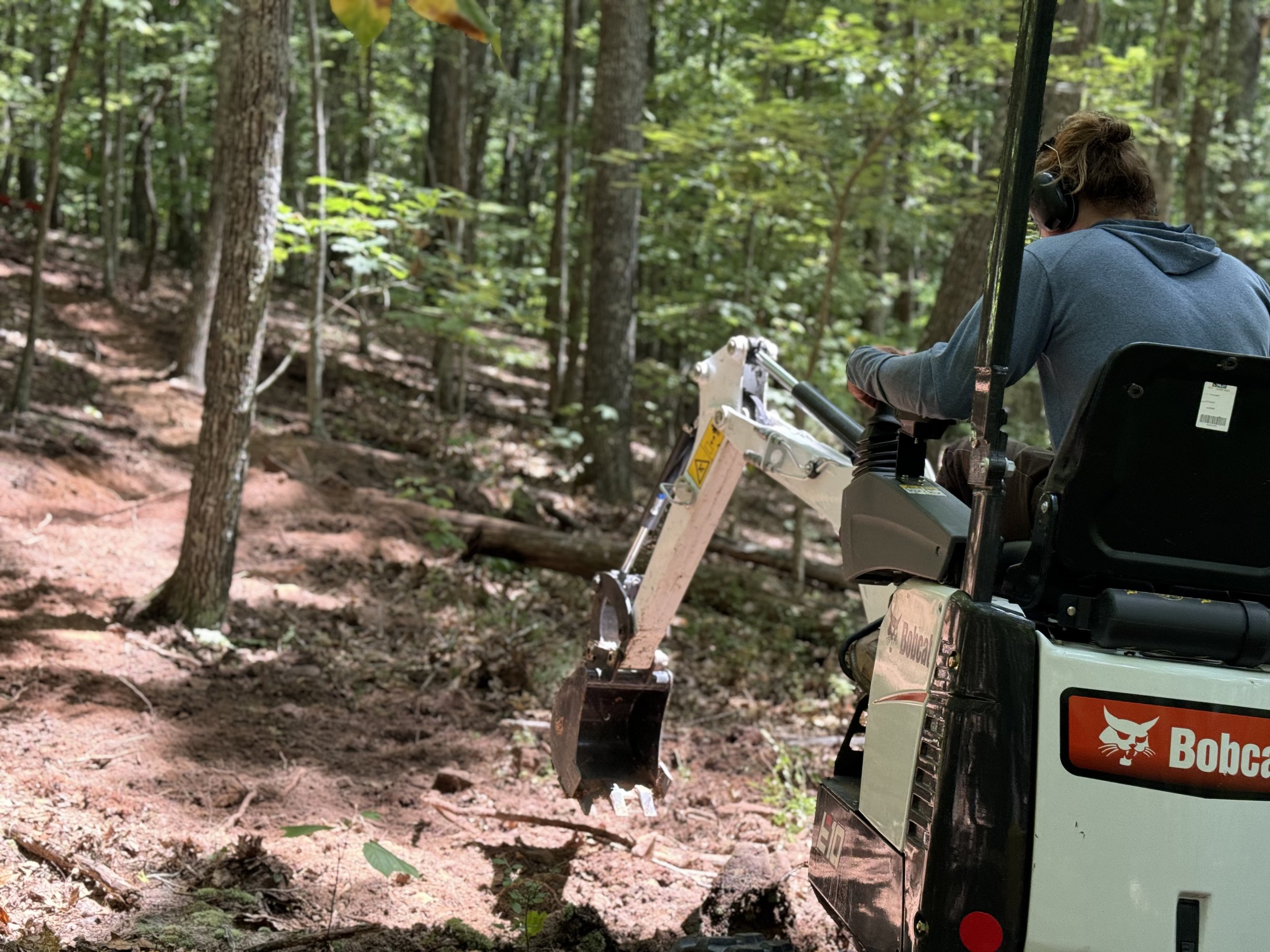
Is Trail Work a Good Fit for You?
Core qualities for success:
Resilient: Endures physical and environmental challenges
Collaborative: Works well with diverse teams and stakeholders
Adaptable: Adjusts to changing plans, weather, and site conditions
Ethical: Acts with integrity in public-facing, land-based work
Solution-Oriented: Tackles field and planning problems with creativity
Hands-On: Eager to build and learn by doing
Passionate: Committed to trails, nature, access, and the related community benefits
Communicative: Shares ideas clearly and listens effectively
Detail-Focused: Catches issues early, ensures high-quality work
Photo: Appalachian Dirt
Getting Started
This six-part series features concise, 4–6 minute videos covering fundamental topics in trail development centered on drainage including contour vs. fall-line trails, sheet flow, understanding grade, how to use a clinometer, water management techniques like grade reversals and rolling grade dips, bench cut trail construction, and more.
Video 1 is live! More videos coming throughout 2025.
Learn Trail Fundamentals
Volunteer on your local trails!
Work with the organization that maintains your local trails and volunteer!
Many trail professionals got their start as volunteers, where they first felt the spark for trailwork. Even if your interests lean more toward program administration, planning, or design, everyone who works in trails should experience the satisfaction of working with hand tools.
Learn about the phases that go into getting a trail on the ground - from concept to construction. The Trail Project Life Cycle web resource also will give you insight into the complexity of the trail industry and the many roles you could play.
In this resource, there are also links to multiple videos and webinar recordings on mechanized trail construction, trail planning, and permitting.
Trail Project Life Cycle
Building Skills
Volunteer with a Professional Crew
Some professional trail companies and nonprofit organizations offer opportunities for volunteers to work alongside their professional crews in the field. These experiences can range from a single day helping with trail maintenance to multi-day projects assisting with construction, habitat restoration, or specialized features.
Volunteering with a professional crew gives you a firsthand look at industry tools, techniques, and safety practices, while building connections with experienced trailbuilders.
Photo: Trailworks
Join a Seasonal Crew
Join a seasonal trail crew - whether through a nonprofit Youth Corps or a federal agency - and gain hands-on experience building and maintaining trails, restoring habitats, and improving outdoor recreation areas.
Seasonal crews offer immersive, team-based work. Many PTBA members began their careers this way, using seasonal experience as a springboard into long-term roles in the trail industry.
The Trail Skills Project Job Board posts summer jobs throughout the winter and early spring with federal and state agencies, as well as nonprofits
Trail jobs with the Corps Network (includes positions with corps around the country)
Trail Skills Project
Launch your Trail Skills Project profile designed to be a 'linked in' style snapshot focused on trail experience and aligned with the competencies (see below).
Based on your profile:
Identify gaps in your trail training and experience
Find upcoming training opportunities
Identify ongoing training programs (including college credit/certificate programs)
Find jobs on the job board and share your profile as part of your application
The Trail Skills Project serves as the workforce hub for the trails community providing connections to trails education, trail expertise, professional development, and job opportunities.
Trail Competencies + Skills
Competencies are the foundation of the Trail Skills Project - and are integrated into the individual profiles as a mechanism of self-assessment.
They are broken out into 5 categories: Construction; Maintenance; Project Planning + Design; Crew Management; Program Administration.
Learn about what it looks like to be at the ENTRY, FULL, and EXPERT levels in the five categories.
Different jobs in the trail sector require different competencies - the goal would not be for one person to attain expert in all competencies or categories. For example, grant management is part of program administration, but someone who is constructing trails may not need this skill set.
Trail Training
Hands-on Experience
Planning, designing, and building trails all require direct, hands-on experience. You need to learn how to read the land, use tools safely and effectively, understand why one section of trail holds up while another erodes, and adapt your approach across different landscapes and ecosystems. And if you want to use mechanized equipment, you need hundreds of hours on a machine to hone your skills.
You can’t master trail development or management from a book, a video, or a classroom alone.
However, your learning curve can be accelerated through focused training and a strong foundation of knowledge.
Training Opportunities
On the Trail Skills Project, you can find upcoming training opportunities.
The listings range from one hour webinars to multi-day hands-on workshops.
Community Colleges and University Programs
There are a growing number of trail programs at community colleges and universities especially following the national adoption of the Trail Competency Framework. You can find the most up to date list on the Trail Skills Project. Below are a few programs where you can earn college credit.
Northwest Arkansas Community College (NWACC)
Trail Technician Program
NWACC's Trail Technician program teaches you the essential skills and techniques required to create and maintain well-designed, safe and sustainable mountain bike trails. Expert instructors guide you through the intricacies of trail construction, maintenance and the principles of conservation.
Through this program, students can earn a certificate of proficiency or technical certificate in the field of trails. They also offer the option to apply your earned course credits toward an Associate of Applied Science in General Technology, which can easily transfer to Arkansas Tech University and be applied toward a Bachelor of Arts in Organizational Leadership.
Central Wyoming College
Trailbuilding Professional Certificate
The Trailbuilding Professional certification integrates field-based training
using hand tools and heavy machinery with first responder training,
geospatial information science and technology (GIST), natural resource
management, and business practices.
This is a 30-credit hour certificate.
West Virginia University
Graduate Certificate Program: Sustainable Trails Development
This comprehensive certificate program covers advocacy, design/build, and post-build opportunities. It features asynchronous online courses, with a capstone project that you can complete either online or in-person during the summer. You can pursue the graduate certificate on its own or alongside a traditional graduate degree.
McDowell Tech
Trail Construction and Sustainability Program
McDowell Technical Community College’s Trail Construction and Sustainability Program offers a great opportunity for both the novice and professional. Basic courses offer a beginner level array of classes for individuals that wish to build and maintain trails as a hobby or for those that wish to move on to the advanced courses for career opportunities or advancement. The advanced courses help individuals develop the skills necessary to become a viable leader and create career opportunities in trail building, maintenance, and sustainability. In addition to the basic and advanced courses, students can gain specialized certifications in specific trail construction types such as hand-built trails, mechanized trails, and greenways. Specialized course series are offered in trail business and contracting. Students will also gain work-based learning credit through on-the job experience during basic and advanced course programs.
Related + Adjacent Degrees
Because college-credit trail programs are still emerging, many trail professionals earn degrees in related fields that support their career goals—such as:
Environmental & Natural Sciences
Environmental Science
Forestry
Wildlife Management
Land and environmental management
Soil Science
Design & Technical Fields
Landscape Architecture
Civil Engineering
Environmental Design
Urban & Regional Planning
Geographic Information Systems (GIS)
Parks, Recreation & Outdoor Leadership
Outdoor Recreation Management
Parks & Recreation Administration
Adventure Education
Outdoor Leadership
Skilled Trades & Technical Fields
Construction Management
Heavy Equipment Operations
Carpentry or Masonry
Welding or Metal Fabrication
Natural Resource Technology
The Trail Technician multiple-choice exam evaluates foundational knowledge in trail development, aligned with the progression from entry-level to full Trail Competency standards.
NorthWest Arkansas Community College (NWACC), with its certification partner NOCTI, engaged with trail industry leaders - including members of the PTBA - to develop this standardized exam. The assessment was successfully beta-tested both during our 2024 conference and through online platforms, and is now officially available.
This test is one way to demonstrate your knowledge to prospective employers.
Trail Technician 1 Test
Career Pathways
Whether you’re just starting out in a seasonal role, operating heavy equipment, or leading crews and projects, there’s a clear path for growth in the trail industry.
Below are five of the most common trail industry roles—the experience and skills each requires, and the typical steps to get there. These roles reference the industry’s competency categories (see the full Trail Competencies and Skill Breakouts) and are based on insights from PTBA members, reflecting real career journeys.
Trail Crew Laborer / Hand Crew
Typical Experience: 0–1 years
Competency Level: Entry in Construction & Maintenance
Build Skills In:
Hand tool use and trail structures
Comprehending trail drainage
Understanding construction specifications
Teamwork and work site safety
On-Ramps:
Seasonal conservation corps
Volunteer trailwork
Outdoor recreation jobs (guiding, ski resort ops, outdoor education)
Construction or landscaping work
PTBA Member Survey Insight: 73% say you can start this role with less than one year of experience.
Photo: Allegra Trails
Machine Operator
Typical Experience: 2–4 years
Competency Level: Full in Construction and Maintenance
Build Skills In:
Mini excavator and dozer operation, maintenance, and repair
Drainage and tread shaping techniques
Implementing construction specifications
Safely operating machinery in varied situations and around crews
On-Ramps:
Progression from hand crew with mechanical aptitude
Equipment operation experience from other industries (e.g., landscaping, forestry, construction, ski resorts)
Mountain bike track building / moto track work
PTBA Member Survey Insight: Over 80% of respondents said this role typically requires 2–4 years of experience.
Photo: Timberline TrailCraft
Crew Leader
Typical Experience: 3–5 years
Competency Level: Full in Crew Leadership, Construction & Maintenance; Entry-Full in Planning & Design
Build Skills In:
Operations and safety supervision
Crew planning, logistics, and project tracking
Crew communication & conflict resolution
On-Ramps:
Demonstrated leadership on trail crews
Crew leader training or certifications
Lead roles in conservation/youth corps
Nonprofit trail leadership
Natural resource field management
Volunteer program coordinator
PTBA Member Survey Insight: 40% say 3–4 years of experience is typical for this role.
Photo Credit: FlowRide Concepts
Project Manager
Typical Experience: 4–6+ years
Competency Level: Expert in Crew Leadership; Full in Administration; Full-Expert in Planning and Design; Full-Expert in Construction and Maintenance
Build Skills In:
Project budgeting, scheduling, logistics, compliance
Balancing multiple project needs, phasing, and invoicing
Client, stakeholder, and regulatory communication
Risk and human resources management
On-Ramps:
Promotion from crew leadership roles
Project management in outdoor fields
Construction management
PTBA Member Survey Insight: Nearly 60% say this role requires 5+ years of experience.
Photo: Kay-Linn Enterprises + Applied Trails Research
Trail Planner / Designer
Typical Experience: 5–6+ years
Competency Level: Full to Expert in Planning & Design; Full in Administration
Build Skills In:
Landscape-level terrain assessment
Trail alignment & design
Trail and structure specification development
GIS & mapping tools
Cost estimation
Permitting & public process management
On-Ramps:
Project manager/crew leader with propensity for landscape level assessment and analysis
Natural resource management
Planning roles in agencies, nonprofits, or private firms
Landscape architect or environmental planner
GIS/mapping roles in conservation or recreation
PTBA Member Company Survey Insight: 66% say this role requires 5 or more years of experience.
Photo: Interior Trails

Beyond the Trail: Where Your Skills Can Take You
Working in the trail industry builds a versatile set of skills - leadership, problem-solving, technical know-how, and a deep understanding of natural landscapes - that can open doors to many other careers.
Experience on trails can translate into roles in conservation leadership, public land management, outdoor education and training, entrepreneurship in outdoor services, environmental consulting, and project management in related industries. No matter where your career path leads, the expertise you gain on the trail can carry you far.






